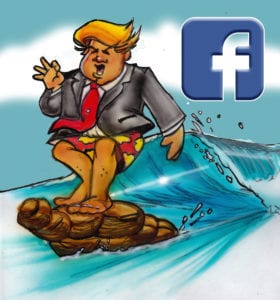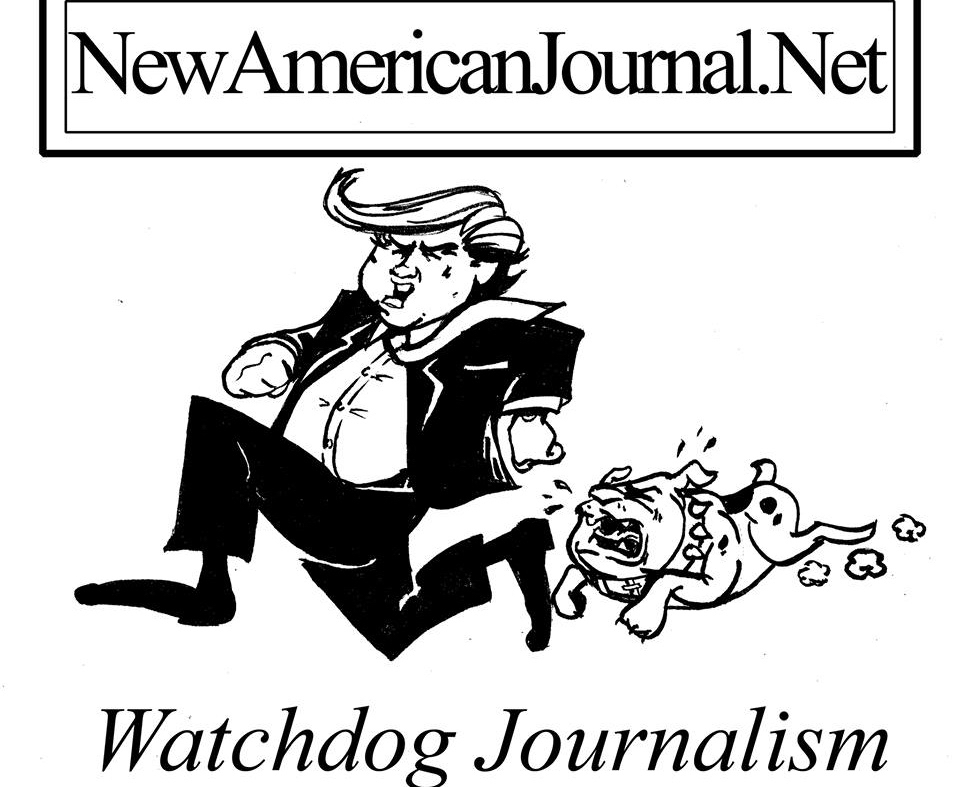Connecting the Dots –
By Glynn Wilson –
As I sit here on a mild winter day on the Gulf Coast drinking coffee from Kenya, eating a banana from Mexico and reading the latest news on “fake news,” I’m thinking it might be preferable to simply log off and eat nails than to have to write this story.
One of my Facebook friends shared a gif yesterday with a picture of a log cabin in the woods. The text asked whether you would take up an offer to stay in the cabin for a month with no internet access — if you had all the food and water and firewood you needed, and if you would receive a check at the end of the month for $100,000.
I did not comment on the post, but I’m thinking I would do it for FREE if they would throw in a month’s supply of good IPA. Maybe after a month long break this “fake news” story will sort itself out.
Are there days when I get tired of dealing with the internet and Facebook and wish I could just find a small weekly newspaper somewhere out west to write for and go back to taking notes with a pen and a reporters pad? You bet.
But then, I really, really do love the freedom of writing for the web.
As my regular readers know, I’ve been covering this fake news phenomenon over the past couple of weeks because I feel a certain responsibility to our readers to sort all this stuff out and try to find and report the truth of the matter as best I can.
There are a few new developments over the past couple of days, so that means no day off for me.
To start with, the Army Corps of the Associated Press, the behemoth wire service that grew up in the 20th century to serve the news gathering and profit motives of the corporate chain newspapers that took over the print news business then, announced on its in-house blog on Thursday that it will work with Facebook to help identify and debunk trending “news” stories being shared online “that are false.”
My first question was why in the world does the AP have a blog in the first place? But I guess you would first have to read my book to understand that one.
Then Facebook’s Mark Zuckerberg also put out an announcement in his notes about the plan.
“We have a responsibility to make sure Facebook has the greatest positive impact on the world,” Zuckerberg says. “This update is just one of many steps forward, and there will be more work beyond this.”
The AP already has stories on the wire that fly under the moniker of “AP Fact Check.” Apparently the programmers are working to incorporate this into the Facebook interface.
Here’s how this will work, apparently.
“… when AP or another participating fact-check organization flags a piece of content as fake, Facebook users will see that it has been disputed and there will be a link to the corresponding article explaining why. That flag will follow the content if a Facebook user chooses to share it.”
In an earlier memo to staff signed by AP “news leaders,” Vice President for U.S. News Brian Carovillano, said: “It is our job – more than ever before – to guide people to legitimate news and help them sort out ‘fake news’ from the real thing. The AP has a critical role to play in fighting the ‘scourge’ of fake news. We are not going to transform ourselves into the fake news police of the internet, but we are going to be more aggressive about knocking down fraudulent stories when we can.”
This will be worth keeping an eye on — to see how it gets abused if nothing else. As I have already written, the mainstream print news outlets in this country, including the AP, have a long history of producing their own brand of fake news.
Don’t just take my word for it. The Columbia Journalism Review just ran a piece on it as well: The real history of fake news.
For its part, Zuckerberg admits that “Facebook is a new kind of platform different from anything before it.”
“I think of Facebook as a technology company, but I recognize we have a greater responsibility than just building technology that information flows through,” he says. “While we don’t write the news stories you read and share, we also recognize we’re more than just a distributor of news. We’re a new kind of platform for public discourse — and that means we have a new kind of responsibility to enable people to have the most meaningful conversations, and to build a space where people can be informed.”
Coming down on the side of caution and humility, Zuckerberg admits that, “With any changes we make, we must fight to give all people a voice and resist the path of becoming arbiters of truth ourselves. I believe we can build a more informed community and uphold these principles.”
As usual depending on its online community, not professional journalists, Facebook is going to make it possible for people to “report hoaxes.” If a certain unspecified number of people report a story as false or a hoax, the programmers will send it to third-party fact checking organizations like the AP.
“If the fact checkers agree a story is a hoax, you’ll see a flag on the story saying it has been disputed, and that story may be less likely to show up in News Feed,” Zuckerberg says. “You’ll still be able to read and share the story, but you’ll now have more information about whether fact checkers believe it’s accurate.”
No one will be able to make a disputed story into an ad or promote it on the Facebook platform, he says.
“These steps will help make spreading misinformation less profitable for spammers who make money by getting more people to visit their sites. And we’re also going to crack down on spammers who masquerade as well-known news organizations.”
Somehow I think this flies in the face of allowing independent news outlets and non-profit groups to promote themselves on Facebook, but we’ll see how this plays out.
There’s more.
Adam Mosseri, Facebook VP for the so-called News Feed, also posted a note he headlined: Addressing Hoaxes and Fake News.
“We believe in giving people a voice and that we cannot become arbiters of truth ourselves, so we’re approaching this problem carefully,” he says. “We’ve focused our efforts on the worst of the worst, on the clear hoaxes spread by spammers for their own gain, and on engaging both our community and third party organizations.”
He divides the work into the four areas and says the programmers will learn from the tests.
First they are going to make it easier for users to report what they think is fake news. Then they are creating a way to flag stories as “disputed,” using signatories of Poynter’s International Fact Checking Code of Principles. Disputed stories may also be pushed down in the News Feed.
“It will still be possible to share these stories, but you will see a warning that the story has been disputed as you share,” Mosseri said. “Once a story is flagged, it can’t be made into an ad and promoted, either.”
The next section on “Information Sharing” is a little more troubling from our point of view.
“We’re always looking to improve News Feed by listening to what the community is telling us,” Mosseri says. “We’ve found that if reading an article makes people significantly less likely to share it, that may be a sign that a story has misled people in some way. We’re going to test incorporating this signal into ranking, specifically for articles that are outliers, where people who read the article are significantly less likely to share it.”
What? This would seem to favor sensational clickbait or even fake news, because people are less likely to click on a boring, factual, straight news headline, read routine news or share it.
On “Disrupting Financial Incentives for Spammers,” Mosseri said, apparently with no tongue in cheek: “Facebook has found that a lot of fake news is financially motivated.”
No shit Sherlock.
“Spammers make money by masquerading as well-known news organizations, and posting hoaxes that get people to visit to their sites, which are often mostly ads (goes on out there),” Mosseri says.
No, he must be joking, right?
“So we’re doing several things to reduce the financial incentives. On the buying side we’ve eliminated the ability to spoof domains, which will reduce the prevalence of sites that pretend to be real publications,” Mosseri said.
This might be a good thing.
But wait.
“On the publisher side, we are analyzing publisher sites to detect where policy enforcement actions might be necessary,” Mosseri said.
He lost me there. But he closes with this cheery note of assurance.
“It’s important to us that the stories you see on Facebook are authentic and meaningful,” he said. “We’re excited about this progress, but we know there’s more to be done. We’re going to keep working on this problem for as long as it takes to get it right.”
How comforting that Facebook and the Associate Press have all our interests at heart. I’ll believe this when AP does a review of my book and then stops reporting false news just to “balance” its stories as “objective” and “fair.”
As an example, look at this, a story on the AP wire today.
Global warming’s fingerprints seen in 24 weird weather cases
The lede.
“A new scientific report finds man-made climate change played some role in two dozen extreme weather events last year but not in a few other weird weather instances around the world. An annual report released Thursday by the National Oceanic and Atmospheric Administration found climate change was a factor, however small or large, in 24 of 30 strange weather events.”
If I was writing that story, it would read like this.
“A new scientific report released Thursday by the National Oceanic and Atmospheric Administration finds man-made climate change played some role in two dozen extreme weather events last year.”
The news is that there is clear scientific evidence that climate change due to global warming from the burning of fossil fuels is in fact going on, today.
Why include the disclaimer? “…but not in a few other weird weather instances around the world … however small or large … in 24 of 30 strange weather events.”
This only confuses readers and gives climate change and global warming deniers the nuggets they need to go on talk radio, Fox News and on social media and claim climate science is a hoax perpetrated by liberal activist George Soros who is paying scientists to say this for their own profit.
Will Facebook — with the help of the AP — flag this story as “fake news?” I seriously doubt it. You won’t see us report that nonsense in the New American Journal. Sorry. But we don’t run fake news. We only tell it like it is. Trust that.
Order your Watchdog Press products here at CafePress.com.















